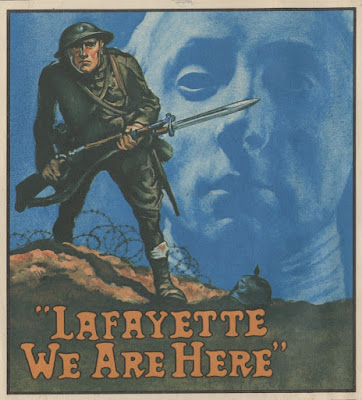We Americans don't like to give full credit to France for what it did for us during our revolution from England. We'd rather focus on how we saved France from the Nazis. And we can't understand why France doesn't show more gratitude when we ask them to back up our foreign policy moves.
Our revolution would likely have fizzled without lots of help from the French. Of course the French had their own reasons for helping us. Just a few years earlier France had lost its possessions in Canada in the French and Indian War. Ironically enough, with the French threat gone, the American colonies no longer felt any need for British protection. We wanted them gone.
When Britain asked us to chip in to pay off the deficit she ran up in the French and Indian War, we started running British appointed governors and judges off the premises. We started hiding gunpowder and arms in the countryside and drilling militia in case our distant Mother tried to chastise us.
But we didn't have very much gunpowder. And our arms were more suited to killing squirrels than enemy soldiers. And our militias were not well regulated. Only a handful of Americans, George Washington for example, had any experience with warfare. Cooler heads in the rebel ranks realized war takes lots and lots of money. Ambassadors traveled to France and the Dutch Republic seeking help. This alone was enough to get a person hung for treason and the ambassadors had to pretend they were just merchants.
The French were willing to listen, but were going to act with caution. Young King Louis XVI had just been crowned two years earlier and relied on his wily foreign minister, the Count of Vergennes, for advice. Ben Franklin was one of the first ambassadors, but he was getting up in years and seemed more interested in having a good time in Paris than pressing Vergennes for cash. John Adams was more serious. He took the trouble to learn French to get his message across. But still the French hesitated to send more than token amounts.
The War for Independence began with the Battles of Lexington and Concord in April of 1775. The Americans won that one by firing at the British from behind trees and rocks as the redcoats tried to get back to Boston. The British were forced out of Boston, but were able to take New York City. This was Britain's best chance to end the revolution. They defeated Washington's army but could not capture or destroy it. When the Americans won the battle of Saratoga in the fall of 1777, the French said Mon dieu! Perhaps it's time to back these enemies of our enemy.
On this day in 1777 France officially recognized the new United States. Soon France itself was at war with Britain. Spain and the Dutch Republic piled on too, and Britain had to move resources out of North America to meet the threat. Now the French started pouring in the armaments and men, spending billions in today's money. By the end, France spent more on the war than Britain did. The war bankrupted both France and Britain. Britain had a fairer system of taxation and was able to recover and prosper. France never did recover, leading to its own revolution a few years later, something Louis must have regretted.
The French don't expect gratitude for their help. It was a long time time ago. Just don't expect a free refill in a Paris cafe in recompense for what your grandfather did at Normandy a long time ago.

Chairman Joe, historian in plain English.
ReplyDeleteIt's good to remember where and how we came from. Thanks!
ReplyDelete